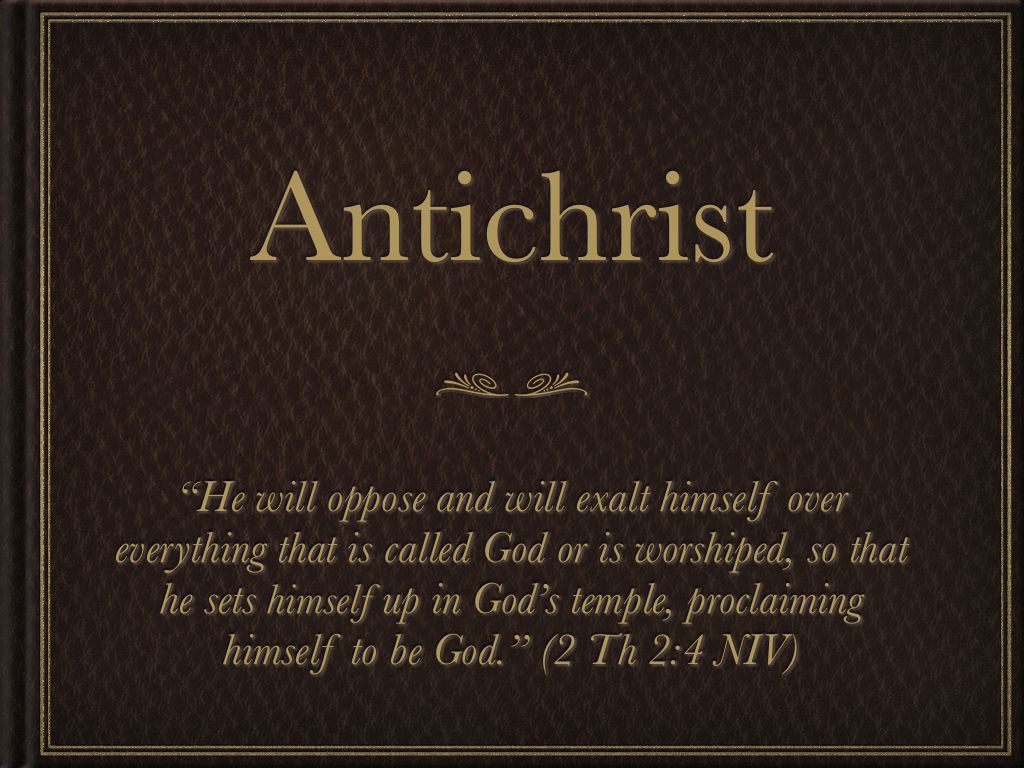Unveiling The Mystery Of Antichrist: A Comprehensive Exploration
The concept of Antichrist has fascinated theologians, historians, and believers for centuries. Rooted deeply in religious texts and cultural narratives, the idea of Antichrist continues to spark debates and discussions across the globe. As a central figure in eschatological beliefs, understanding the role and significance of Antichrist is essential for anyone interested in theology, history, or apocalyptic literature.
From ancient scriptures to modern interpretations, the narrative of Antichrist has evolved over time. This article aims to provide an in-depth analysis of the concept, exploring its origins, characteristics, and impact on society. Whether you are a religious scholar or a curious reader, this exploration will offer valuable insights into one of the most intriguing figures in religious history.
By delving into the historical, theological, and cultural aspects of Antichrist, we hope to shed light on this complex subject. Our goal is to present a balanced and well-researched perspective that respects diverse viewpoints while providing factual information. Let us embark on this journey of discovery together.
Read also:Park City Utah Ski Area A Winter Wonderland For Adventure Seekers
Table of Contents
- Origins and Historical Context of Antichrist
- Biblical Interpretation of Antichrist
- Characteristics and Traits of Antichrist
- Symbolism and Allegory in Antichrist Narratives
- Historical Impact and Influence
- Modern Interpretations and Pop Culture
- Controversies and Debates Surrounding Antichrist
- Theological Perspectives on Antichrist
- Psychological Insights into Antichrist
- Conclusion and Call to Action
Origins and Historical Context of Antichrist
The origins of Antichrist can be traced back to early Christian writings, particularly in the New Testament. The term "Antichrist" first appears in the letters of John, where it is described as a deceptive force that opposes Christ. Historically, the concept gained prominence during the early Church era as a way to warn believers against false teachings and leaders.
In the context of early Christianity, the idea of Antichrist served as a tool for reinforcing orthodoxy and unity within the Church. It was often used to identify and combat heresies that threatened the established doctrines. Over time, this concept evolved, incorporating elements from Jewish apocalyptic literature and Greco-Roman mythology.
Historical Development of Antichrist
The development of Antichrist narratives was influenced by various historical events, including the persecution of Christians and the rise of the Roman Empire. These narratives often reflected the fears and anxieties of the time, painting Antichrist as a symbol of oppression and tyranny.
Key historical milestones in the evolution of Antichrist include:
- The writings of early Church Fathers, such as Irenaeus and Tertullian, who expanded on the concept.
- The influence of medieval mystics and theologians, who further developed the idea of Antichrist as a precursor to the end times.
- The Protestant Reformation, during which Antichrist was sometimes associated with the Catholic Church.
Biblical Interpretation of Antichrist
In biblical texts, Antichrist is primarily mentioned in the First and Second Epistles of John. These passages warn against false prophets and emphasize the importance of discernment. While the term "Antichrist" is specific to these letters, related concepts can be found throughout the Bible, particularly in the Book of Daniel and the Book of Revelation.
Key Biblical References
The following biblical references are commonly associated with the concept of Antichrist:
Read also:Pioneer Press Obituaries Today Your Comprehensive Guide To Remembering Lives
- 1 John 2:18 – "Children, it is the last hour, and as you have heard that antichrist is coming, so now many antichrists have come. Therefore we know that it is the last hour."
- Revelation 13:1-18 – Describes a beast with seven heads and ten horns, often interpreted as a symbol of Antichrist.
- Daniel 7:21-22 – Mentions a "little horn" that speaks arrogantly and wages war against the saints.
Characteristics and Traits of Antichrist
According to traditional interpretations, Antichrist possesses several defining characteristics. These traits are often described in apocalyptic literature and serve as warnings for believers to remain vigilant. Some of the key characteristics include:
- Deception – Antichrist is known for spreading false teachings and misleading people.
- Charisma – Often depicted as a charismatic leader who gains widespread influence.
- Opposition to God – Antichrist actively works against the will of God and seeks to establish his own authority.
- Power and Authority – Typically portrayed as wielding immense political and religious power.
Psychological Profile of Antichrist
From a psychological perspective, Antichrist can be seen as a representation of human flaws such as pride, arrogance, and the desire for control. Understanding these traits can help individuals recognize similar patterns in contemporary leaders and movements.
Symbolism and Allegory in Antichrist Narratives
Antichrist narratives are rich in symbolism and allegory, often drawing on broader themes of good versus evil. These stories serve as cautionary tales, warning against the dangers of moral corruption and spiritual complacency. Symbols such as the "beast" and the "mark of the beast" have become iconic representations of Antichrist in popular culture.
Common Symbolic Elements
Some of the most common symbolic elements associated with Antichrist include:
- The number 666 – Often interpreted as a sign of imperfection and rebellion against God.
- The "beast" – Represents a powerful and oppressive entity that seeks to dominate others.
- The "false prophet" – Symbolizes deception and manipulation in religious contexts.
Historical Impact and Influence
Throughout history, the concept of Antichrist has had a profound impact on religious and political landscapes. It has been used to justify wars, persecutions, and ideological conflicts. At the same time, it has inspired art, literature, and philosophical inquiry, contributing to a deeper understanding of human nature and spirituality.
Antichrist in Political Discourse
In political contexts, Antichrist has often been invoked to criticize leaders perceived as tyrannical or oppressive. This use of the concept highlights its enduring relevance as a tool for social critique and resistance against authoritarian regimes.
Modern Interpretations and Pop Culture
In contemporary society, Antichrist continues to captivate audiences through various forms of media. Movies, books, and music frequently explore themes related to Antichrist, offering new interpretations and perspectives. These modern adaptations often reflect current societal concerns and anxieties, making Antichrist a timeless figure in popular culture.
Examples in Pop Culture
Some notable examples of Antichrist in modern media include:
- The movie "The Omen" series, which portrays a child as the Antichrist.
- Books like "Left Behind," which explore end-times scenarios involving Antichrist.
- Music by artists such as Marilyn Manson, who have drawn inspiration from Antichrist symbolism.
Controversies and Debates Surrounding Antichrist
The concept of Antichrist has sparked numerous debates and controversies over the years. These discussions often revolve around theological interpretations, historical associations, and cultural implications. Some critics argue that the idea of Antichrist promotes fear and division, while others see it as a valuable tool for spiritual reflection.
Key Points of Contention
Some of the main points of contention include:
- The identity of Antichrist – Who or what represents Antichrist in modern times?
- The role of religion – How should religious institutions address the concept of Antichrist?
- The impact on society – Does the idea of Antichrist contribute to prejudice and discrimination?
Theological Perspectives on Antichrist
Different theological traditions offer varying perspectives on Antichrist. While some view it as a literal figure who will appear at the end of times, others interpret it as a metaphor for human failings and societal challenges. These diverse viewpoints enrich the conversation and provide opportunities for deeper exploration.
Comparative Analysis
A comparative analysis of theological perspectives reveals:
- Protestant views – Emphasize the importance of personal faith and discernment.
- Catholic views – Focus on the role of the Church in combating false teachings.
- Eastern Orthodox views – Highlight the spiritual battle between good and evil.
Psychological Insights into Antichrist
From a psychological standpoint, Antichrist can be seen as a manifestation of collective fears and anxieties. It represents the darker aspects of human nature and serves as a reminder of the importance of self-awareness and moral integrity. By examining Antichrist through this lens, we gain valuable insights into the complexities of human behavior and societal dynamics.
Implications for Personal Growth
Understanding Antichrist from a psychological perspective can lead to personal growth and development. It encourages individuals to reflect on their own values, beliefs, and actions, fostering a greater sense of responsibility and accountability.
Conclusion and Call to Action
In conclusion, the concept of Antichrist remains a fascinating and multifaceted subject that continues to intrigue and challenge us. By exploring its origins, characteristics, and cultural significance, we gain a deeper appreciation for its enduring relevance. Whether viewed as a theological, historical, or psychological phenomenon, Antichrist offers valuable lessons for navigating the complexities of modern life.
We invite you to share your thoughts and insights in the comments section below. Engage with fellow readers and continue the conversation. For more articles on related topics, explore our website and discover a wealth of knowledge waiting to be uncovered. Together, let us strive for greater understanding and enlightenment.


